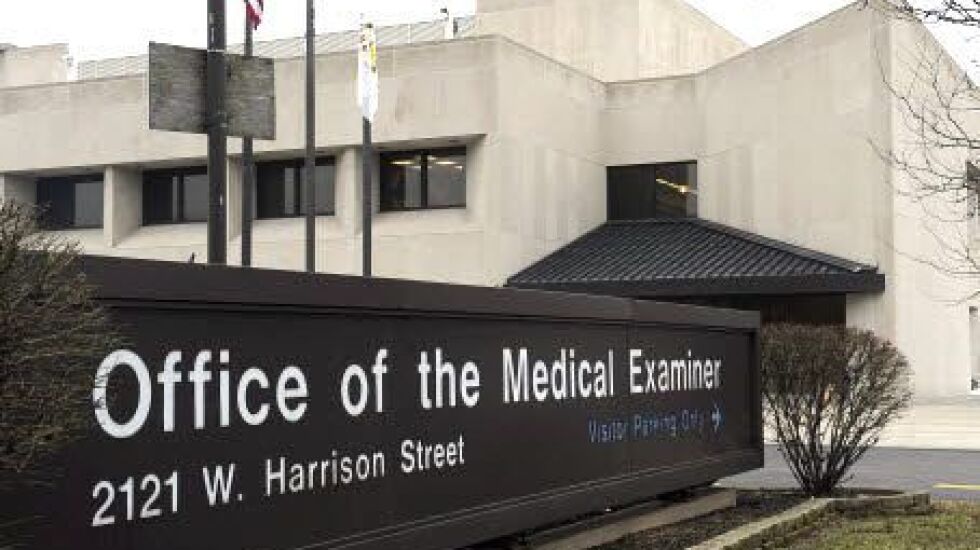
Kenneth Purnell knows what it’s like to fight “the monster of addiction.” So does Jerome McNutt. Both men got clean in recent years after multiple stints behind bars and just barely skirting death.
They credit treatment programs, support groups, counseling and family members who wouldn’t give up on them for helping get them on the long road to recovery.
Organizations that provide treatment and support are essential to handling addiction as a public health problem.
Too many people — likely close to 2,000 in Cook County once the numbers are finalized — died in 2023 from opioids. Even if 2022’s record of 2,001 deaths remains intact, more people will have died from opioid-related causes than in vehicle accidents and homicides combined, as Natalia Derevyanny, spokeswoman for the Cook County medical examiner’s office, told us.
Thousands more escaped death in 2023 but still live precariously because they’re not ready for, can’t find or can’t afford treatment.
Purnell remembers the moment in spring 2020 when he finally, after 15 years, off and on, of getting high, wanted to get sober. Dressed in the same clothes he had been wearing a few days earlier, after surviving a near-fatal overdose that landed him in the hospital, Purnell returned to his aunt’s home, where he had been sleeping on the couch. He got into a fight with his uncle over who could smoke the last bit of a cigarette. Not the whole cigarette, just one piece.
“That’s when I came to the decision that I had to change,” Purnell told us.
He called his mom, who immediately took him to Haymarket Center, where he did several days of detox and a rapid stabilization program. He then completed a 60-day in-patient program at the Salvation Army’s Harbor Light Center.
While there, Purnell, a chef, got the idea to make soup for people living on the streets, with the help of The Night Ministry and Annie’s Table. By fall 2020, he was serving soup to the homeless riding the CTA’s Red Line and soon launched his own nonprofit, Souper Heroes.
He has partnered with a few other groups, including the Westside Heroin Opioid Task Force, which several times a month distributes the overdose-reversing drug naloxone and, when funding is available, hands out food, too.
“People come for the soup, and that’s when they offer the Narcan,” said Purnell, now 43.
McNutt decided to get clean about six years ago, not long after his mother died, because he no longer had a place to stay. After decades of drug abuse (mostly heroin and cocaine), his other family members were fed up and wouldn’t allow him to move in.
His treatment included an out-patient program and a stay in a recovery home. Finding a place to live where he couldn’t get drugs or be near people still using was critical. So was having the determination to start a new life. “You’ve got to have a plan,” said McNutt, now 62 and working as a security supervisor on TV production sets.
Smart funding of treatment programs is key
Funding of treatment programs like those that helped Purnell and McNutt is challenging. Unlike other medical conditions, treatment centers are generally funded with grants, which means a constant churn for funding, program operators say.
“Every substance abuse provider has to fight for more grants,” Haymarket President and CEO Dan Lustig told us.
Consistent, adequate funding for treatment, through government programs or health insurers, would help. The same goes for funding for outreach work, such as the program Haymarket operates on the CTA’s Blue Line, where workers offer housing, treatment and other services to those who need it. The Blue Line travels through parts of the city where overdose numbers are among the highest.
As well, Chicago and suburban police departments should keep exploring alternatives to get drug users who have run-ins with the law into treatment rather than jail.
The public can do its part by stepping up if we suspect someone is overdosing. Anyone can easily administer Naloxone, also known by the brand name Zimhi (an injection) or Narcan (a nasal spray). The overdose reversal medication is available at Chicago public libraries, several West Side gas stations and at many pharmacies.
Opioid-related deaths are preventable. With better funding of treatment programs, a different approach to drug users who run afoul of the law and more action that handles addiction as a health condition, not a moral failing, more lives can be saved.
The Sun-Times welcomes letters to the editor and op-eds. See our guidelines.







